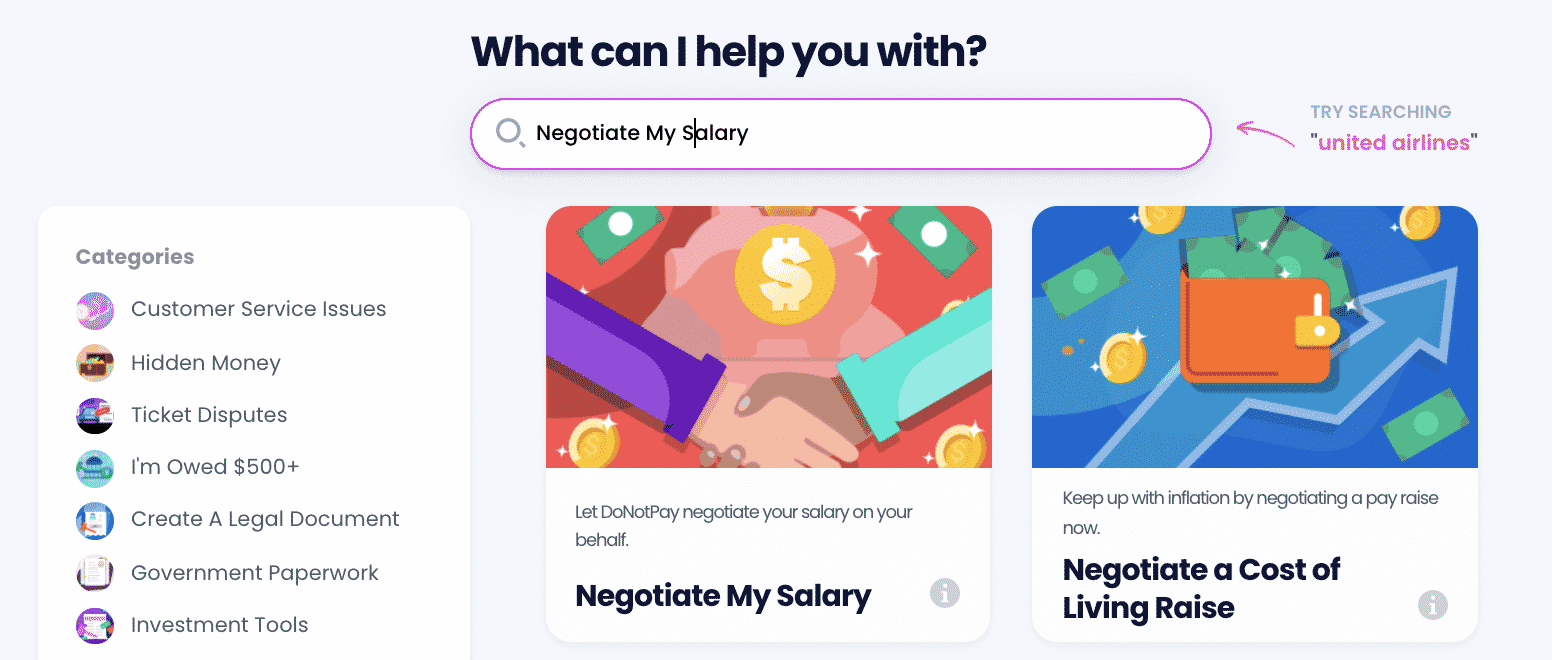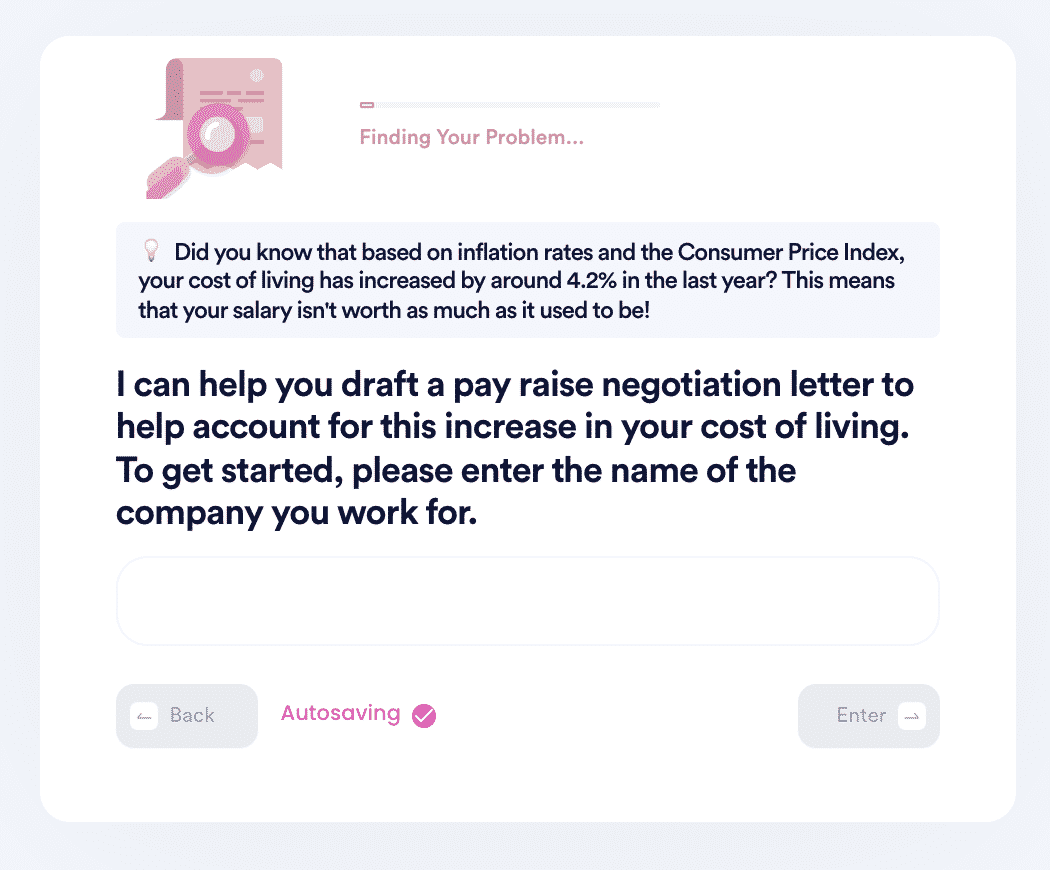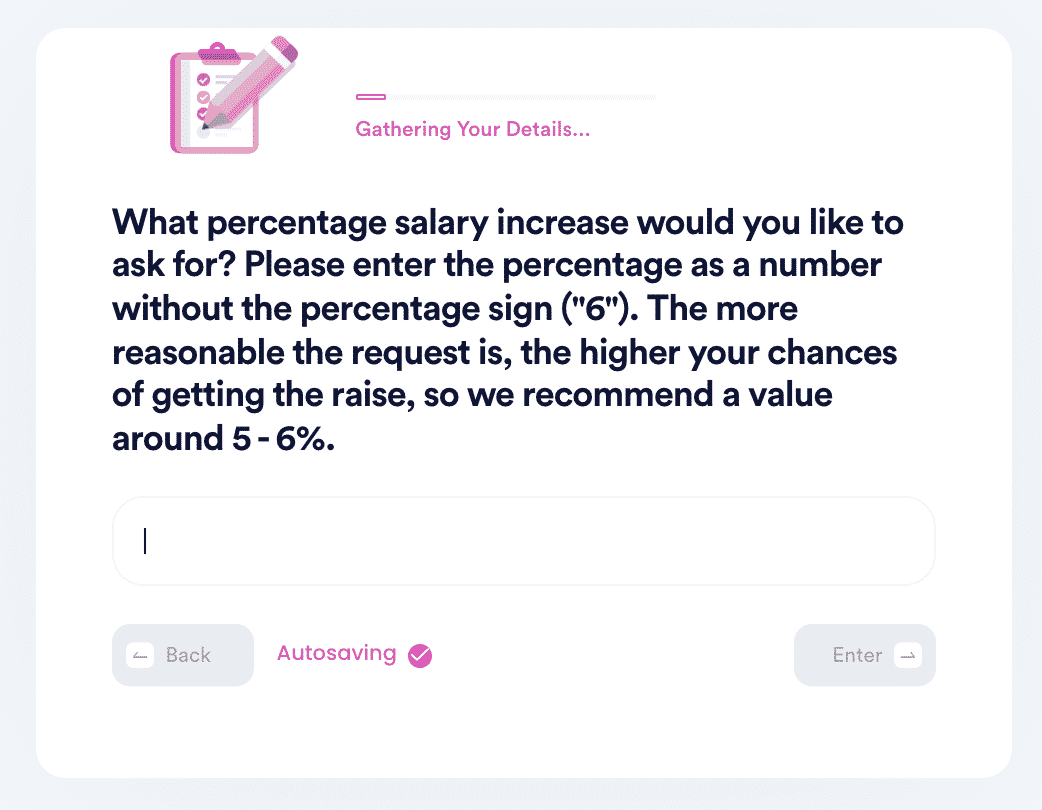Salary Negotiation Script That'll Help You Get a Raise
There comes a time in everyone's career when they are allowed to participate in salary negotiation discussions. These discussions are an excellent opportunity for you to express to your management team the hopes and requests you have for your salary as you go forward.
Many people find these discussions to be uncomfortable, and sometimes find themselves stumbling through the conversation. This lack of confidence can often prove detrimental to your cause as your requests may go unspoken or unapproved due to the mismanagement of the words.
Not to worry, however, DoNotPay can help you to create the perfect to help you clearly, concisely, and expertly communicate your salary negotiation points.
Is It Time for a Raise? How Often Do Raises Occur?
One of the many important aspects of salary negotiations is to have an awareness of when is the right time to enter the negotiation process. Most salary negotiations occur shortly after your review with your management team or manager. Reviews are usually held annually or semi-annually, with the majority of companies granting raises after a year of employment and subsequently on an annual basis.
If you are requesting a review or raise, it is generally acceptable to open negotiations every twelve to eighteen months.
A few of the acceptable reasons for requesting or receiving a raise include the following:
| You have more responsibility in your position | Perhaps you have grown with your position, and your team so that your role has expanded well beyond what your original position entailed. More responsibility is a good reason to expect more compensation. |
| You received a promotion | This one is, perhaps, the most obvious reason for receiving a raise. If you have stepped up and into a new role, especially one that is a step-up, it is natural to expect a raise in your salary. |
| You have been with the company for a prolonged length of time | The longer you are with a company the more likely it is for you to receive a raise. Loyalty is a hard quality to find, and many companies reward employee loyalty generously. |
If you have decided that it is, in fact, time for you to request a raise, or if you have a meeting with management already set to discuss your salary, feeling comfortable with the conversation can go a long way toward ensuring success. can help you to craft a salary negotiation script that is effective and clear and assists you in achieving your salary goals.
How Do You Ask For a Salary Negotiation and Raise on Your Own?
are some of the most important conversations you will have in your workplace. These are the conversations that will determine your compensation and the standard of living for you and your family. Knowing how, and when to ask for a raise or discuss your salary, can make the difference between moving onward and upward and staying stuck in your current economic pattern. A few tips on asking for a raise or salary negotiations include the following:
- Wait for the right time - As was discussed in the previous section, timing is everything. Knowing when and how to ask for a discussion surrounding your salary and a raise can make all the difference in your success with the conversation.
- Apply for a promotion or new position - This will allow management to see you have a vision and want to grow with the company, and are not just asking for more money.
- Know your value and have a number in mind - Do some research and know what compensation comparable positions and skill levels are receiving. Be comfortable presenting evidence to support your salary request and prove its validity.
- Show your value long before the discussion happens - This is perhaps the single most important thing you can do to ensure your salary negotiations are a success. Show your manager and management team that you are priceless and contribute greatly to your team and the company.
- Stay positive, receptive, and open in the discussion - Be sure to keep a positive tone throughout the conversation. Be receptive and open to feedback, both positive and negative, and keep an open mind, looking for possibilities within the discussion to contribute positively to your company.
How you enter and proceed through your salary negotiation can make the difference between success and stalemate. Knowing how to confidently converse with your manager and management team conveys a positive message that will encourage them to approve your request. This is often easier said than done, however, and many people trip over their words, become over-emotional, and falter in these discussions. This is where DoNotPay can help.
DoNotPay can help you to put together to ensure that you can communicate, concisely, and positively with your management team and in so doing, help you to achieve your salary goals.
Solve Your Salary Negotiation Challenges with DoNotPay
As was mentioned previously, it can be a challenge to negotiate your salary, and your raise, on your own. Salary negotiations are some of the most vital conversations you will have, not only in your workplace but in your life. These discussions affect the quality of life for you and your family and have the potential to make or break your future. That being the case, many people struggle with engaging their managers in a manner that effectively communicates their salary needs and requests and renders the discussion all but futile.
DoNotPay can help you to create the perfect salary negotiation scripts to help you ensure that you communicate in a manner that is confident, clear, respectful, and concise, enabling you to have every opportunity to partake in successful salary negotiations. To have DoNotPay help you, follow the simple steps below:
- Search “negotiate my salary” on DoNotPay.

- Enter the name of your company and the industry you work in, so we can find the right wage statistics for your role.

- Answer a series of questions regarding your qualifications and achievements, relocation expenses, and other job offers if applicable.

- Enter the new base salary you would like to request.

knows how important salary negotiations are to your life, and we are prepared to help you put together the salary negotiation script that can help you achieve your salary goals.
DoNotPay can also help you:
- Learn how to ask for a raise through email
- Learn how much raise you should ask for.
- Learn if you should negotiate salary.
- Learn how to negotiate salary over the phone.
- Learn how to negotiate salary through email.
- Learn how often you should get a raise.
Solve Other Challenges with DoNotPay
DoNotPay can help you with much more than . DoNotPay has a vast amount of experience in a variety of industries and is well-equipped to help you handle many of life's challenges. For example, DoNotPay can help with any of the below situations, and much more:
- Reducing property taxes
- How to cancel various subscriptions and memberships
- How fighting workplace discrimination works
- Chargebacks and refunds
DoNotPay can help you to put together a powerful salary negotiation script, as well as help you to identify and implement solutions to a variety of problems and challenges you may be facing. Let DoNotPay help you today.


